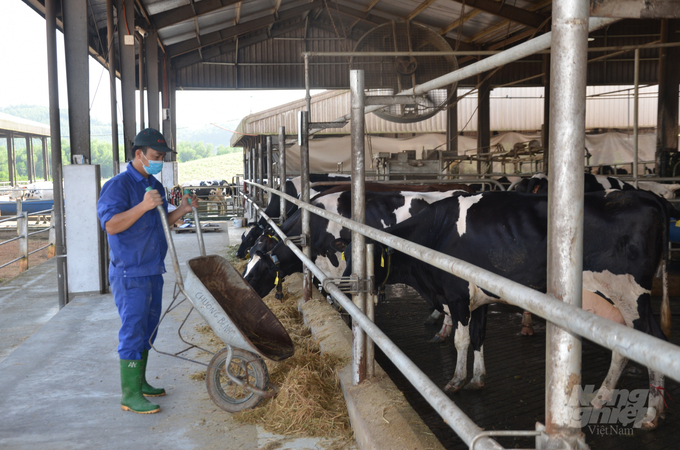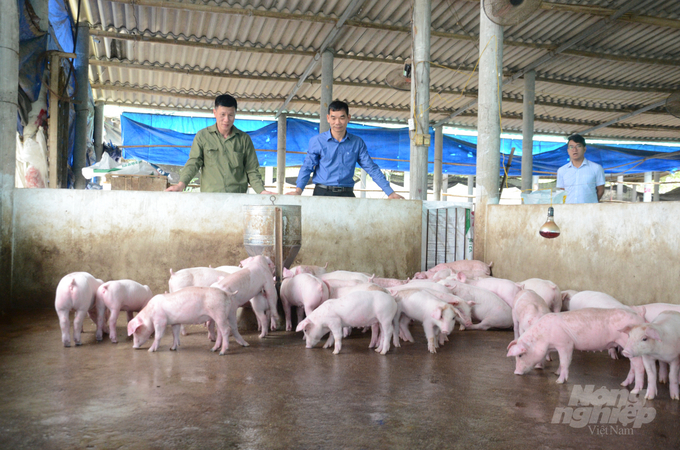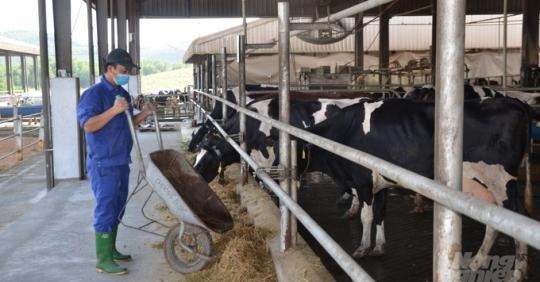
Ho Toan Joint Stock Company Dairy Farm implements disease-proof breeding practices well. Picture: Dao Thanh.
At present, there are 100 livestock farms in Tuyen Quang Province, including 1 international standard GlobalGAP farm, 2 the farm is certified for high-tech applications; 5 certified large farms; 26 livestock and aquaculture farms VietGAHP certified disease-free; 70 livestock and fisheries cooperatives operate in the form of joint ventures conclude; 31 OCOP certified livestock and fishery products from 3 stars; 3 stamps are maintained (buffalo, Minh Huong duck, Tan Tao chicken).
Most of Tuyen Quang ranchers are aware of the role and importance of safe livestock farming and know the disease safety regulations such as regular vaccination and strict disinfection, and minimize access to the livestock area.
For 3 years, Mr. Bui Huy Cuong’s family biosecurity-focused pig farm in Thai Binh Township, Yen Son District has been saying no to the disease. Currently, Mr. Cuong’s biosecurity farm has about 400 native black pigs. For the biosecurity of pig farming, Mr. Cuong specifically applies the “3 nos” principle: do not use industrial bran as feed for pigs; do not use antibiotics, lean substances; does not pollute the general environment.
Mr Cuong said farmers will face many risks during this period if the disease is not well controlled. In addition to the increase in feed, low livestock prices and the occurrence of diseases will prompt farmers to do so effort to raise.

Livestock farmers, especially large livestock households in Tuyen Quang, focus on disease prevention awareness. Picture: Dao Thanh.
Ta Thi Kieu’s family farm in Dong Tau Village, Luong Thien Township, Son Duong District, has just released 100 live pigs. Immediately after selling her pigs, Ms. Kieu implemented solutions to sanitize and disinfect her family’s breeding area, using chemicals and lime powder for disinfection.
Ms. Kieu said that after a rearing cycle, fungi or pathogens that are harmful to livestock may appear in the barn, so the stage of decontamination, disinfection and sanitation of the barn is very important to ensure that the barn is disease-free from the new batch .
This year, the pig price is low, the price of animal feed has increased, so Kieu’s family does not massively degraze, but only raise about 50 pigs in the near future. Ms. Kieu chooses to purchase breeding pigs from reputable farms with clear origins to ensure healthy, germ-free breeds. When rearing pigs, she consistently implements routine vaccinations against common diseases to minimize the risks that can arise for the herd.
Accompanying growers, the sub-division always closely adheres to the places to recommend farmers in times of disease outbreaks, to accompany them without delay when there is a new epidemic, to take measures to treat and control disease outbreaks.
The subdivision has also coordinated with other units preparing an annual disease prevention and control plan; Promote the construction of disease-free areas and facilities, animal husbandry toward disease safety; Encouraging the construction of concentrated slaughterhouses or slaughter and processing associated with livestock farming according to local planning.
Mr. Dao Duy Quy, director of the Animal Husbandry and Veterinary Medicine Subdivision in Tuyen Quang, said the guarantee of disease-free livestock production is better done by the breeders now, because if it is not done well, the victims will suffer in this case livestock farms directly, especially large agricultural holdings.
In order to prevent an avian flu epidemic in the changing season, Tuyen Quang Livestock and Veterinary Medicine Subdepartment has so far supplied 200,000 doses of vaccine to 7 counties and cities to conduct bird flu vaccination campaigns for flocks, poultry and waterfowl.
In order to ensure the safety of farm animals, Tuyen Quang’s farming industry has issued recommendations that recommend farmers to follow good disinfection and sterilization procedures, especially in the stages of animal husbandry seasons such as: using lime powder or antiseptic chemicals for spraying, disinfecting barns. ..
Farms and households importing breeders from outside are required to identify reputable farms, have quarantine certificates, arrange for isolation for at least 2 weeks before entering the herd, have cattle and poultry fully vaccinated with all types of disease vaccines and apply biosecurity breeding practices to limit disease outbreaks.

